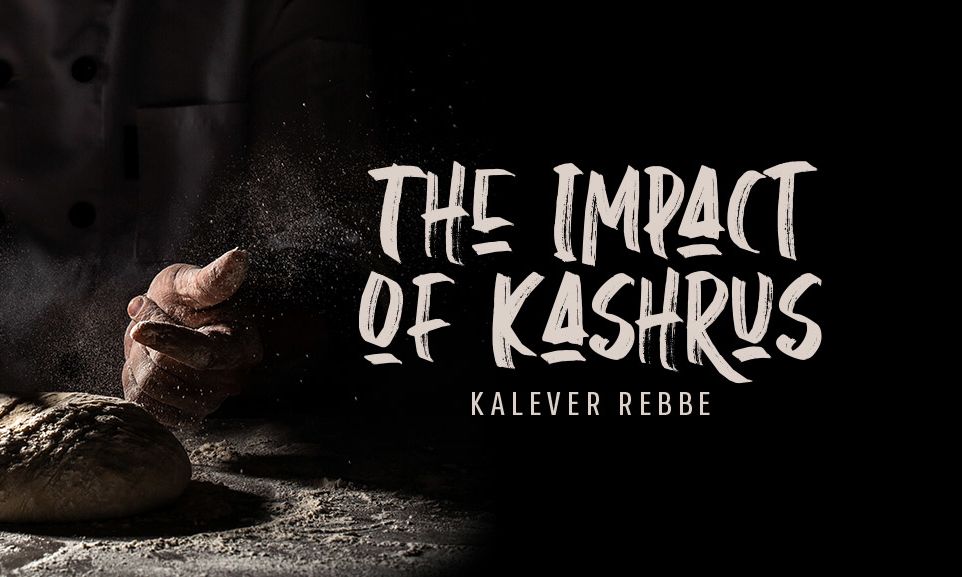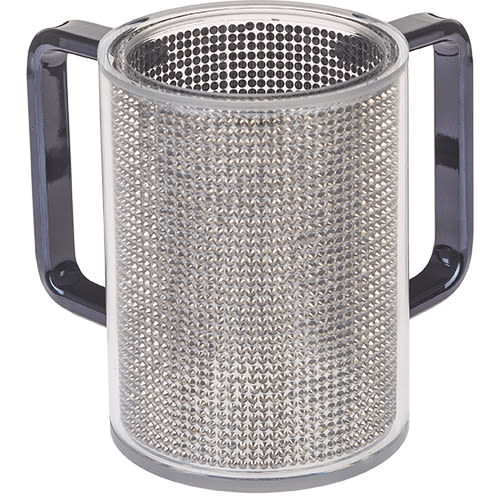
Impact of Kashrut
During the summer months when we're travelling or vacationing, it's easy to let our standards of kashrut slip. The ensuing damage has a lasting impact on our neshamah and on our emuna.

Speak to the children of Israel saying: If a man dies and has no son, you shall transfer his inheritance to his daughter. (Bamidbar 27:8)
During the summer months, it can be particularly challenging for some yidden to observe the laws of Kashrut diligently while they are traveling. They might be at resorts or in exotic locations where kosher food is more difficult to find.
They see other people eating in a restaurant or at the hotel, and they just assume that the food is “kosher enough”. However, they don’t investigate the particular hashgachah, supervision, and its reliability. They don’t do their due diligence to ensure that every standard of Kashrut is being observed 100 percent.
Therefore, given these realities, it is imperative that we address the importance of Kashrut and the tremendous damage that results when even the slightest aspects of the laws are compromised.
Course of Treatment
When a doctor prescribes a course of treatment for an ill patient, may Hashem protect us, they follow every detail of the doctor’s recommendation without hesitation. A patient does not postpone the start of treatment until they understand the complexities of their illness and the prescribed treatment. Rather, the patient understands that the doctor has years of schooling and training. They knew that the medicines have been developed over years and sometimes decades of research and development. The patient trusts and relies on the expertise of the medical community.
Even when the treatment is physically and psychologically difficult and the medicine is bitter, patients comply because they trust that at the end of their treatment they will have a full recovery, living a joyous and long life.
Likewise, if a doctor instructs someone to avoid food or medicine because it would be life threatening given their current condition, they will listen. Even if that food or medicine tastes delicious, they will not waver, they will not partake because they trust the medical advice that has warned them about the inevitable consequences of such an indulgence.
We trust the advice and guidance of the medical community even though we have seen that their views have changed over the years with the development and discovery of new science, new understandings, and new treatments. The cutting-edge treatments of the past are now even considered barbaric in some cases.
Hashem the Healer
If people have this level of trust in the medical community, even more so should a person behave loyally and faithfully in his avodat Hashem, his service to Hashem, who is the “Healer of flesh” as it says, “I am Hashem your Healer” (Shemos 15 26).
Hashem, as the creator of all creation and the sustainer of all of existence at all times, alone knows what man and the world needs to find completion. Within the complex design of mankind and this world, Hashem provided the yidden with a handbook, the Torah, that offers detailed instructions that can guide a yid towards a meaningful, fulfilling, and happy life. As the Torah says, “You are life, and you shall have long days…” (Devarim 30:20). Through observing the Torah, a yid can connect to the Giver of Life and merit a full and complete life.
When a yid understands how instrumental the Torah is, how each mitzvah is like a prescription for his ultimate benefit, then he will do whatever is within his power to be meticulous in his observance of Torah and mitzvot.
This is relevant to all of the mitzvot including Kashrut. When a yid realizes how important Kashrut is, when he understands the depths of the mitzvah, he will avoid eating anything whose quality of Kashrut is even slightly suspect. He will be careful and meticulous. Even if he is in a place where kosher food is difficult to find, he will remain diligent.
The Soul’s Nutrition
Rambam, who was a brilliant doctor as well as a Torah scholar, when explaining the mitzvot of Kashrut and what is forbidden to eat, he wrote, that when someone eats impure food from an animal whose nature is evil and cruel, those horrible qualities become transformed from the food into your being, thus harming your body and soul.
The Zohar HaKodesh taught that anything that is not kosher is tied to the Sitra Achra, the evil forces and impurity. When a person consumes something not kosher, when he receives nourishment from that food, then the evil that was embedded within those nutrients becomes absorbed in his body and he damages his neshama, the true core of a person. If food was impure and not kosher, your body and soul are sustained by those impurities. They become part of who you are, having a lasting impact.
Even an Olive Size
Throughout the generations, the tzadikim went to great lengths to ensure that the yidden did not eat non-kosher foods, and that they didn’t compromise their standards.
R’ Meir Schwartz from London once told me that when he first began working as a butcher for a modern community, he felt very uncomfortable working among so many other butchers who were not as diligent and meticulous as himself. However, he wasn’t sure if he should resign over that. After the war, the Skver Rebbe, zt”l, visited London on his way to America. R’ Meir was still very conflicted, and he decided to seek the Rebbe’s advice.
After explaining his situation, the Rebbe told him: all of these troubles are worth it even if you can save only one yid from eating an olive-sized amount of non-kosher meat!
It was better for R’ Meir to remain in his position and do all he could to ensure that the product adhered to the highest Kashrut standards.
Impact on Faith
The Baal Shem Tov, zt”l, related (Tzefnat Penach p. 64) that some heretics came and challenged the Rambam on the issue of resurrection, techiyas hameisim. They had many sources in support of the concept and many that were in contradiction.
The Rambam himself didn’t answer these individuals but he wanted this to be a teaching moment for his own students, whom he told, “See, these people must have eaten non-kosher food and the impurities of that food have entered their bloodstream which, in turn, infected their minds. This is the only explanation for why they are doubting one of the core elements of the Jewish faith; a faith that has been ingrained in the hearts of the Jewish people since Avraham Avinu.
One’s emunah is clearly impacted by the food they eat.
Education
When parents are not careful what they feed their children, they can harm their children’s emunah. The Pri Chadash wrote (Yoreh Deah siman 81, se’if kattan 26): Nowadays, there are people who are lenient with Kashrut for their children. And the majority of these children become attracted to the bad elements of society and they become the rebels of this generation. They don’t have yirat shemyaim (fear of heaven) in their hearts. Even if you try to educate them, to reprimand their behaviors, they will not listen.
“If a Man Dies”
Our pasuk above is alluding to this very idea. When the pasuk says “…if a man dies…” it is referring to a person who believes that their death is permanent; someone who doubts techiyat hameisim. When someone lacks emunah, faith, in a basic core principle of Yiddishkeit, it is clear, as the Rambam taught his students, that he has not been careful and diligent in observing the laws of Kashrut.
Therefore, the pasuk continues, “…and has no son…” Since he was not careful with Kashrut and allowed leniencies for his children, he will have children who struggle with their faith, who find it difficult to connect to Hashem and his Torah, and are drawn to the impurities of the world and the worst of society.
Hashem willing, everyone should strengthen their observance of Kashrut and continue to be meticulous with what and how they eat. In that merit, they will have long years, filled with health and happiness and their lives will be filled with emunah, and they will merit to raise happy, healthy, children who have a love for Hashem and his Torah.
***
The Kalever Rebbe is the seventh Rebbe of the Kaalov Chasidic dynasty, begun by his ancestor who was born to his previously childless parents after receiving a blessing from the Baal Shem Tov zy”a, and later learned under the Maggid of Mezeritch zt”l. The Rebbe has been involved in outreach for more than 30 years, and writes weekly emails on understanding current issues through the Torah. Sign up at www.kaalov.org.










Tell us what you think!
Thank you for your comment!
It will be published after approval by the Editor.